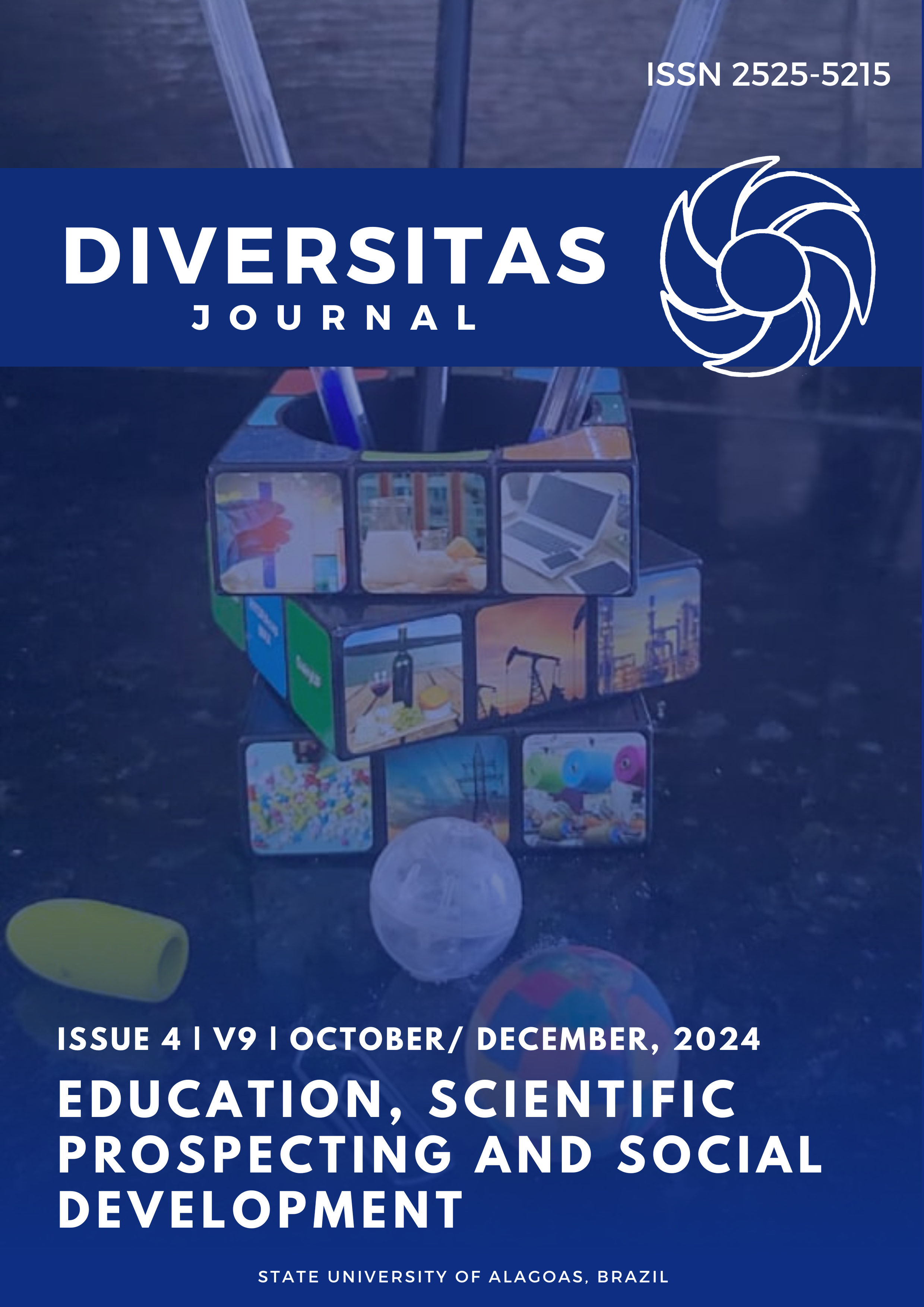Environmental education and sustainability: From the perspective of 9th grade elementary school students
DOI:
https://doi.org/10.48017/dj.v9i4.3060Keywords:
awareness, sustainable habits, environmental perceptionAbstract
Teaching focused on Environmental Education (EE) and Sustainability contributes positively to the formation of people who are aware and committed to building a sustainable society. This work was developed with the objective of identifying and analyzing the perceptions about EE and Sustainability of students in the 9th grade of elementary school in a municipal public school, located in the city of Girau do Ponciano, Alagoas. The methodology used was qualitative and quantitative, and involved 32 students, of whom 65.6% were female, while the others (34.4%) were male. To capture the students' previous perception of the theme, an initial questionnaire was applied, followed by a didactic-pedagogical expository intervention, later, another questionnaire was applied to verify the impacts of the methodology used. The results show that although the students (65.6%) affirm that issues about EE and sustainability are addressed in their school, there is no project focused on these themes, according to the statement of 90.6% of the students. The students consider the topics of sustainability and EE important and most of them practice sustainable habits in their daily lives, however, most of them were not aware of the principle of the 5 R's. Therefore, it is notorious that the approach to the sustainability and EE themes should be more contextualized in the school environment to contribute positively to the acquisition of knowledge by these students, also helping to promote awareness and development of skills to deal with environmental challenges.
Metrics
References
Alkmin, E. B. (2015). Conscientização Ambiental e a percepção da comunidade sobre a coleta seletiva na Cidade Universitária da UFRJ. Dissertação (Mestrado de Engenharia Urbana) - Universidade Federal do Rio de Janeiro, Rio de Janeiro, RJ. Disponível em: http://www.dissertacoes.poli.ufrj.br/dissertacoes/dissertpoli1443.pdf. Acesso em: 11 nov. 2024.
Araújo, F. J. O., Costa, E. O., & Rodrigues, J. D. (2018). A importância das palestras nos eventos
institucionais do CES/UFCG como ação motivadora: relato de experiência. Anais III
CONAPESC, Campina Grande. Disponível em: https://www.editorarealize.com.br/artigo/visualizar/42846. Acesso em: 11 nov. 2024.
Brasil. (2018). Base Nacional Comum Curricular (BNCC). Educação é a Base. Brasília, MEC/CONSED/UNDIME. Disponível em: http://basenacionalcomum.mec.gov.br/images/BNCC_EI_EF_110518_
versaofinal_site. Acesso em: 11 nov. 2024.
Brasil. (s.d.). Ministério do Meio Ambiente. A política dos 5 R's. Brasília.
Disponível em: http://www.mma.gov.br/comunicacao/item/9410. Acesso em: 11 nov. 2024.
Brito, A. G. O (2012). Jardim Zoológico enquanto espaço não formal para promoção do desenvolvimento de etapas do raciocínio científico. Dissertação (Mestrado em Ensino de Ciências) Universidade de Brasília, Brasília.
Carvalho, I. C. M. (2009). Educação ambiental. Educação e Realidade, 34 (3), 11-15.
Carvalho, N. L., Ribas, M. A., Carvalho, T. G. M. L., & Barcellos, A. L. (2020). Percepção ambiental de alunos do ensino fundamental no município de Tupanciretã/RS. Rev. Monogr. Ambient. Santa Maria, 19 (e7).
Chaer, G., Diniz, R. R. P., & Ribeiro, E. A. (2012). A técnica do questionário na pesquisa educacional. Revista Evidência, 7 (7).
Dias, A. A. S., & Dias, M. A. O. (2017). Educação ambiental. Revista de direitos difusos, 68 (2), 161-178.
Dias, G. F. (1992). Educação Ambiental: princípios e práticas. Gaia Editora.
Ferraro, L. A., Jr., Mendonça, P., Sorrentino, M., & Trajber, R. (2015). Educação Ambiental como política pública. Educação e Pesquisa, 31 (2), 285-299. Disponível em: www.scielo.br/pdf/ep/v31n2/a10v31n2.pdf. Acesso em: 11 nov. 2024.
Gadotti, M. (2008). Educar para a sustentabilidade. Inclusão social, 3 (1).
Gohn, M. G. (2006). Educação não formal na pedagogia social. In: Proceedings of the 1. I Congresso Internacional de Pedagogia Social.
Gressler, L. A. (2007). Introdução à pesquisa: projetos e relatórios. (3ª ed.). Loyola.
Guanabara, R., Gama, T., & Eigenheer, E. M. (2008). Os resíduos sólidos como tema gerador: da pedagogia dos três R’s ao risco ambiental. REMEA - Revista Eletrônica do Mestrado em Educação Ambiental, 21.
Guimarães, M., & Vasconcelos, M. (2006). Relações entre educação ambiental e educação em ciências na complementaridade dos espaços formais e não formais de educação. Educar em Revista, 27, 147-162.
Marques, W. R. A., Rios, D. L., & Alves, K. dos S. (2022). A percepção ambiental na aplicação da educação ambiental em escolas. Revbea, 17 (2), 527-545.
Medeiros, A. B., Mendonça, M. J. S. L., Sousa, G. L. & Oliveira, I. P. (2011). A importância da Educação Ambiental na escola nas séries iniciais. Revista Faculdade Montes Belos, 4 (1).
Narcizo, K. R. S. (2009). Uma análise sobre a importância de trabalhar educação ambiental nas escolas. Revista eletrônica Mestr. Educ. Ambient., 22.
Ruscheinsky, A. (2009). Educação ambiental. Penso Editora.
Salgado, M. S., Chatelet, A., & Fernandez, P. (2012). Produção de edificações sustentáveis: desafios e alternativas. Ambiente Construído, 12, 81-99.
Vasconcellos, H. S. R. (1997). A pesquisa - ação em projetos de Educação Ambiental. In: PEDRINI, A. G. (org). Educação Ambiental: reflexões e práticas contemporâneas. Vozes. Disponível em:
http://www.suapesquisa.com/educacaoesportes/educacao_ambiental.htm. Acesso em: 11 nov. 2024.
Downloads
Published
How to Cite
Issue
Section
License
Copyright (c) 2024 Ítala Rosane Gomes Santos, Alinne Vívia Feitosa Bezerra, Jessica Pinheiro dos Santos, Gelvana de Jesus Santos, José Jhonatan Leandro de Farias, Claudimary Bispo dos Santos, Janimara Marques da Silva

This work is licensed under a Creative Commons Attribution 4.0 International License.
The Diversitas Journal expresses that the articles are the sole responsibility of the Authors, who are familiar with Brazilian and international legislation.
Articles are peer-reviewed and care should be taken to warn of the possible incidence of plagiarism. However, plagiarism is an indisputable action by the authors.
The violation of copyright is a crime, provided for in article 184 of the Brazilian Penal Code: “Art. 184 Violating copyright and related rights: Penalty - detention, from 3 (three) months to 1 (one) year, or fine. § 1 If the violation consists of total or partial reproduction, for the purpose of direct or indirect profit, by any means or process, of intellectual work, interpretation, performance or phonogram, without the express authorization of the author, the performer, the producer , as the case may be, or whoever represents them: Penalty - imprisonment, from 2 (two) to 4 (four) years, and a fine. ”


















